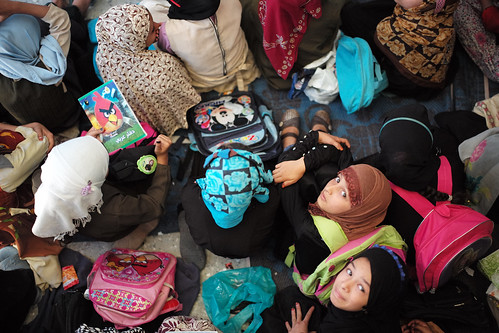 Nada Al-Ahdal is a Yemeni girl who fled an arranged marriage when she was ten years old. Now eleven, she made an appearance on Lebanese television to discuss the issue of child marriage opposite a Muslim cleric.
Nada Al-Ahdal is a Yemeni girl who fled an arranged marriage when she was ten years old. Now eleven, she made an appearance on Lebanese television to discuss the issue of child marriage opposite a Muslim cleric.
When talking about why she chose to run from marriage, Nada said “I didn’t run away just because of the (intention) to marry me off, but because of the ignorance and because I wanted to study…They told me (marriage) was a game, but it isn’t. It turns you into a servant, and places a burden that is greater than you can bear on your shoulders.”
Nada’s family promised her in marriage to a 26 year old man she did not know after the man paid a $2,000 bride price. Likewise, her 14-year old sister was married and her 12-year old sister engaged. Like many child brides, Nada comes from an impoverished family that could greatly benefit from the money they receive for their daughters’ hands in marriage and from the reduced financial burden of having to provide food, clothing and education to so many children.
Nada and other girls who have spoken out against child marriage express concerns about the physical risks of early marriage and about being forced to leave school. Additional risks come when some child brides later face divorce or abandonment by their husbands, leaving them without an education or any means of support for themselves or their children.
The Muslim cleric speaking opposite Nada insisted that a father has the right to arrange a contractual marriage for his daughter from the time she is born. He stated that “there is consensus about this in the Muslim world…this is an accepted custom.” He differentiated between contractual marriage and the actual consummation of that marriage. When questioned about when he thinks a girl is old enough to consummate a marriage, he stated that there is no specific age because only the girl and her female relatives can decide if she will be physically harmed by intercourse.
In September, the international spotlight focused upon Yemen after an 8-year old child bride reportedly died from internal bleeding due to genital tearing just days after consummating her marriage to a 40-year old man. This event drew attention to the extremely high rates of child marriage seen in Yemen, with girls commonly being married to men several times their ages. As of 2006, 52% of Yemeni girls were married before they turned 18 and 14% before they turned 15-years old.
Despite attempts by activists and politicians to create a legal restriction on the minimum age for marriage, no legislation currently exists in Yemen and religious clerics continue to oppose such a restriction, calling it “un-Islamic.” Liesl Gerntholtz, women’s rights director for Human Rights Watch stated “thousands of Yememi girls have their childhood stolen and their futures destroyed because they are forced to marry too young.”
Creative Commons Love: Julien Harneis on Flickr.com
Written by Amanda Lubit
